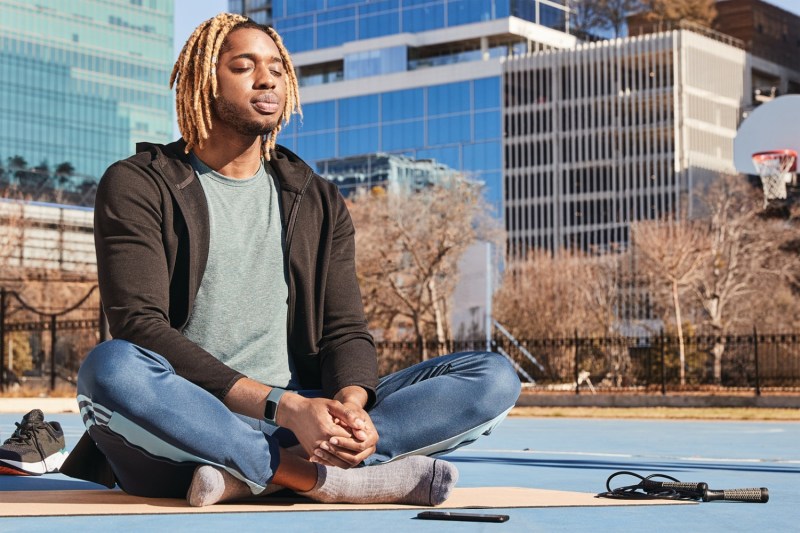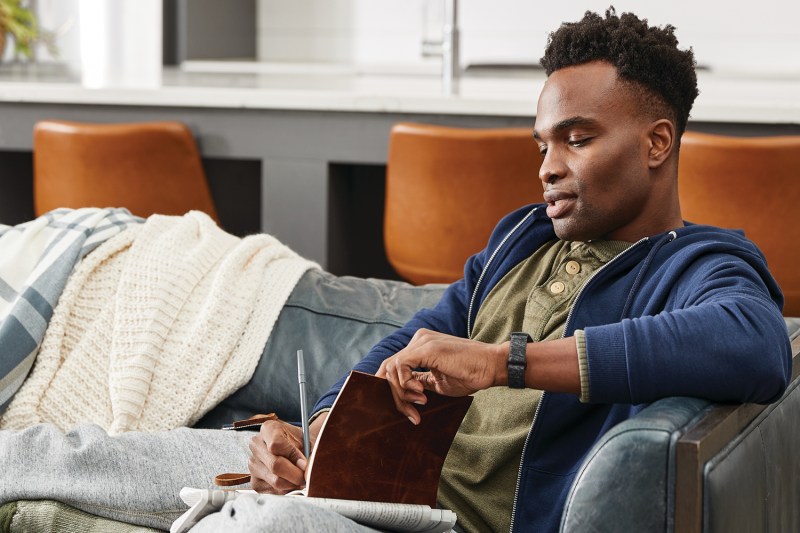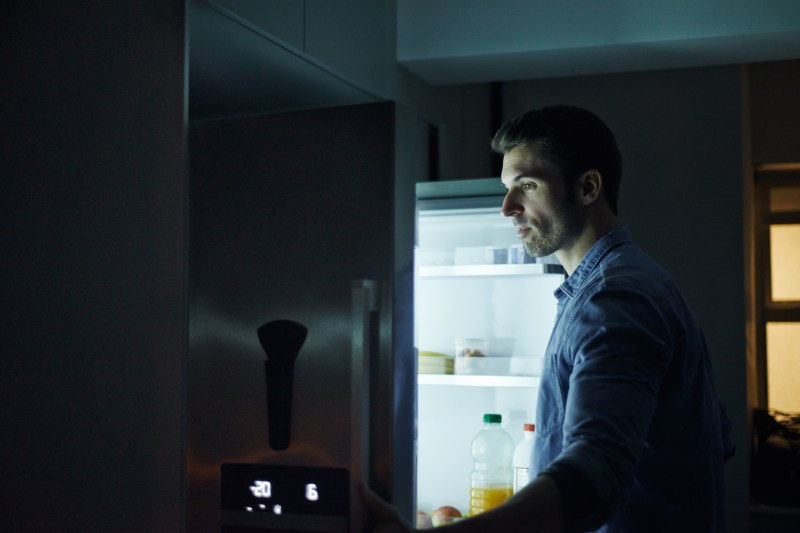
It’s not an exaggeration to call Conor Heneghan, the father of modern sleep science. After his mid-’90s Ph.D. through Columbia University in electronic and electrical engineering, he spent the next decade developing the technology and algorithms used to detect chronic illness in slumbering patients through radio waves and electrocardiographs (known as EKGs). But over that time, he watched the machinery shrink, and by the mid-aughts, the hardware became small enough that, like a chicken in every pot, the future might find a miniature computer on every wrist, silently tracking biometric data.
Despite his decades on the hospital side, he was wooed into the wellness space in 2015 by Fitbit, where he continues to research sleep for the original fitness wearable company, including for its new Charge 5.
“I thought there was a better impact to get downstream, where people are healthy still,” he told The Manual.
Keep reading for tips from Heneghan on how to sleep better and reduce stress.
Conor Heneghan on how to get better sleep

Quality sleep, Heneghan said, is a critical component for everything from peak performance in your rec league basketball team to critical problem-solving in the workplace. But don’t think that you have to hit a magic number every night, even when deadlines are looming, and that you’ll then be sufficient. “There’s no single size fits all,” he adds, drawing from his decades of research on the subject. “You don’t have to sleep eight hours every night to be healthy.”
Whether you feel that you’ve mastered a good night’s sleep or can run into sleeplessness when the pressure mounts, Heneghan laid out the best ways to achieve a good night’s rest so that you perform your best in the coming days.
How much sleep do I need?

There’s not so much a number as there is a range, but the short answer is between five and nine hours every night. A night of under five hours of sleep, Heneghan explained, can lead to physical and mental impairment. Decision-making suffers while the risk of hypertension rises.
Likewise, if you’re sleeping more than nine hours, there are likely underlying medical issues that necessitate your hibernation, and you should see a doctor. It’s not merely stodgy academics’ words that suggest this: Fitbit confirmed this itself by constructing a memory game for a sample of 5,000 users and comparing the results to their previous night’s sleep metrics.
“People are reasonably resistant to sleep deprivation,” Heneghan said. If you miss an hour or two, there’s no significant falloff in performance. But when users dip under five hours, “You start to plummet,” according to Heneghan. Pick a number and stick to it, adding or subtracting as necessary.
Does alcohol affect sleep?

Do you remember those college days when you could drink enough to feel it at the bottom of your eyeballs before falling like a pine into your bed? Well, you’re older now, and even back then, the quality of your sleep likely wasn’t that great.
“If you look at your sleep metrics, you’ll see the effects of alcohol pretty easily,” Heneghan explained. “It does, on average, help people fall asleep a little bit quicker, but then they get much more restless sleep during the night. The overall effect is negative.”
The next day, besides a hangover, you’ll feel groggy and sluggish. Even if you think a stiff drink or six will help you nod off, you’re nonetheless better off sticking to your glass of water.
Keep your sleep to a routine

“It’s pretty dull, but going to bed at the same time, getting up at the same time, those people sleep more efficiently,” Heneghan said. This is possibly one of the easiest in your besieged sleep routine’s arsenal: Regardless of the stress you’re under, when it’s time for bed, it’s time for bed. That means turning off Netflix, putting the book down, and stopping the doom-scrolling on your phone in order to focus on the task at hand — counting sheep. Your body will thank you the next morning.
Wind down before bed

For the hour preceding your bedtime, it’s time for a wind-down routine. You’re trying to avoid stimulation. For some, it may be reading a book for pleasure, completing Sudoku puzzles, or even watching something light on a streaming service. Lower the lights — “Light levels stimulate the hormones that keep us awake,” Heneghan told us. “You’re just trying to lower the mental stimulation.” Avoid thriller movies, political Twitter threads, and your company’s Slack channels. This time is for you, and your keyword is “taper.”
Sleep or exercise?

Most people would think that exercising before bed might tire them out enough to crash after a hard day. Others might believe that all that stimulation would prevent quality rest. The reality is that results are inconclusive. “We don’t see a huge correlation between the two,” Heneghan told us. His suspicion is that outside the laboratory, people in the real world sometimes have to choose between more sleep or a workout.
“The whole thing becomes a wash,” he said. He rushes through the spiel that yes, people should work out — after all, that’s the reason he left the hospital for Fitbit in the first place — but unless you can get your workout in around three hours before bedtime (and if you’re stressed, you may not have the time), it’s better to skip the gym and turn in at your usual hour. If you need to work out in the evening, save the high-intensity workout for the next morning, pick a workout that can help you de-stress, and give yourself ample time to shower and relax before you hit the sack and turn the lights off.
Eating before bed

In Charles Dickens’ 1843 novella, A Christmas Carol, protagonist Ebenezer Scrooge blames his otherworldly guests on something he ate just before bed. “There’s more of gravy than of grave about you, whatever you are!” he said.
But is there any truth to the effect of a late dinner on sleep in the real world? “I don’t know how scientific it is,” Heneghan said. And yet, out of an abundance of caution, he recommends finishing your last meal around three hours before your bedtime, thereby avoiding an awkwardly restless night in bed.
Foods to avoid right before bed
In keeping with the above, here’s a list of the types of foods you should absolutely avoid right before bed to help you get a better night’s sleep:
- Caffeinated foods and drinks
- Spicy foods
- High-fat foods (such as greasy and fried foods)
- Heavy meals
- Sugary snacks
- Acidic foods
- Tyramine-rich foods (such as aged cheeses and processed meats)
Best sleeping gadgets

Are there items that you can use prior to or during sleep that will increase its quality? When it comes to blue-light-blocking glasses, meh. “I’ve seen a few studies that say, yeah, it works, and then a few studies that say the amount of light change is so insignificant that it’s probably not going to be much of a difference,” Heneghan explained.
“I just think low [light] levels, in general, are going to be a more critical factor.” However, blackout curtains are great, because they block more light while also dampening sound. The thermostat is also a valuable ally — men tend to prefer cooler temps than women, so crank it down between 68 and 70 degrees. White noise machines or even an app on your phone, especially if you’re in a louder urban area, can also be beneficial.
Fitness wearables

Whether you think you’ve been getting good sleep or poor, the best way to get a benchmark is through the new crop of fitness wearables, led by the Charge 5. Fitbit pioneered wrist-mounted sleep tracking more than 10 years ago, and the brand has only continued to refine its algorithms and technology in the years since. Its 24/7 measurements are sliced and diced within its mobile app, which allows you to dig down to the microscopic level or simply survey your level through a one-to-100 score. It’s useful for both establishing a baseline and checking progress. If you incorporate any of these methods, you’ll know for certain whether your desired changes are taking effect.
We hope this helps you develop better habits and patterns for better nights’ sleep.



